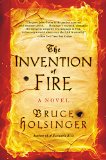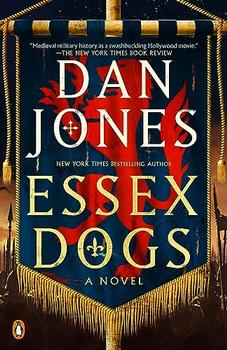Summary | Excerpt | Reviews | Beyond the book | Read-Alikes | Genres & Themes | Author Bio

The year is 1386. King Richard II is in the tenth year of his reign, having ascended to the English throne in 1377 as a ten-year-old boy. The country is in the midst of a prolonged conflict with its long-time enemy, France (a conflict which posterity will remember as the Hundred Years' War), and the country is once again readying itself for confrontation with its Gallic neighbors. Meanwhile, just when London, the beating heart of Richard's realm, must steel itself against possible invasion, the city finds itself riven with conflict from within, as age-old hostilities between the two seats of power - the commercial center ruled by the Guildhall and the political center based in the royal Palace of Westminster - once again bubble to the surface.
The cause of these latest "simmering tensions between the city and the crown" is the gruesome discovery of sixteen dead men in the Walbrook, a river that acts as a conduit for much of London's human waste. Called upon to investigate is John Gower, the poet and close friend of Geoffrey Chaucer (see 'Beyond the Book'), who is also a self-described "conniver and extractor [of secrets]." Gower's inquiries soon take him on a not-so-merry dance from the imposing Tower of London, across the choppy waters of the English Channel, into war-weary France. As he sets about deciphering the mysterious fate of the "mound of ruined men," a dark tale unfolds which encompasses "a murder, a mayor, a maudlin and a scribe...corpses, guns, banners, the witnessing of children...a serpent with a burning cord in its fangs, a flashing knife in a dark square...an emptied gaol, a clearing in the woods, [and] the beguiling whisperings of a duke."
Much like his protagonist, John Gower, the author Bruce Holsinger is a man of many parts. A professor of medieval and modern literature at the University of Virginia, he is well qualified to be a historical novelist. Expertly blending fact with fiction, this imagined tale of political intrigue, ambition and greed is built upon a solid foundation of meticulous research. It is a story woven with accurate and convincing detail which lends the narrative an immediacy that is often lacking in historical fiction. This attention to accuracy, however, is occasionally taken too far - at times the book becomes slightly overburdened with detail. Case in point: the explanation of London's complicated civic bureaucracy and the in-depth technical descriptions of medieval armaments.
Creative mingling of fact with fiction is also much in evidence in Holsinger's characterizations. Real-life figures like the corrupt Nicholas Brembre ("perhaps the most powerful mayor in London's history"); the Duke of Gloucester ("the youngest of the king's powerful uncles"); and Geoffrey Chaucer himself (he "could pull stories from his mind like groats from his purse...one of the most blindly vain men I knew") share the page with a host of credible fictional creations, such as a bawdy midwife and a mad hermit, to produce an absolutely convincing and indeed fascinating cast of characters.
Language is always a challenge for historical novelists, particularly when dealing with any period prior to the development of modern English. While the use of some contemporary language is often necessary for authenticity, too much will render the novel inaccessible and alienate the reader. In The Invention of Fire, Holsinger strikes a fine balance. There is a satisfying smattering of idiomatic Middle English vocabulary throughout (indeed, words like "gong farmer" (someone who cleaned excrement from cesspits) and "night soil" (feces) may well send the reader in search of a dictionary), but their use does not interrupt the narrative flow.
The second in a series, The Invention of Fire is a richly resplendent and descriptive murder mystery which stands on its own and conjures up a vivid and wholly realistic depiction of medieval London in all its loud, vibrant, filthy glory.
![]() This review was originally published in The BookBrowse Review in May 2015, and has been updated for the
March 2016 edition.
Click here to go to this issue.
This review was originally published in The BookBrowse Review in May 2015, and has been updated for the
March 2016 edition.
Click here to go to this issue.

If you liked The Invention of Fire, try these:

by Dan Jones
Published 2023
The New York Times bestselling historian makes his historical fiction debut with an explosive novel set during the Hundred Years' War.

by Qiu Xiaolong
Published 2022
The legendary Judge Dee Renjie investigates a high-profile murder case in this intriguing companion novel to Inspector Chen and the Private Kitchen Murder set in seventh-century China.
Some books are to be tasted, others to be swallowed, and some to be chewed on and digested.
Click Here to find out who said this, as well as discovering other famous literary quotes!
Your guide toexceptional books
BookBrowse seeks out and recommends the best in contemporary fiction and nonfiction—books that not only engage and entertain but also deepen our understanding of ourselves and the world around us.